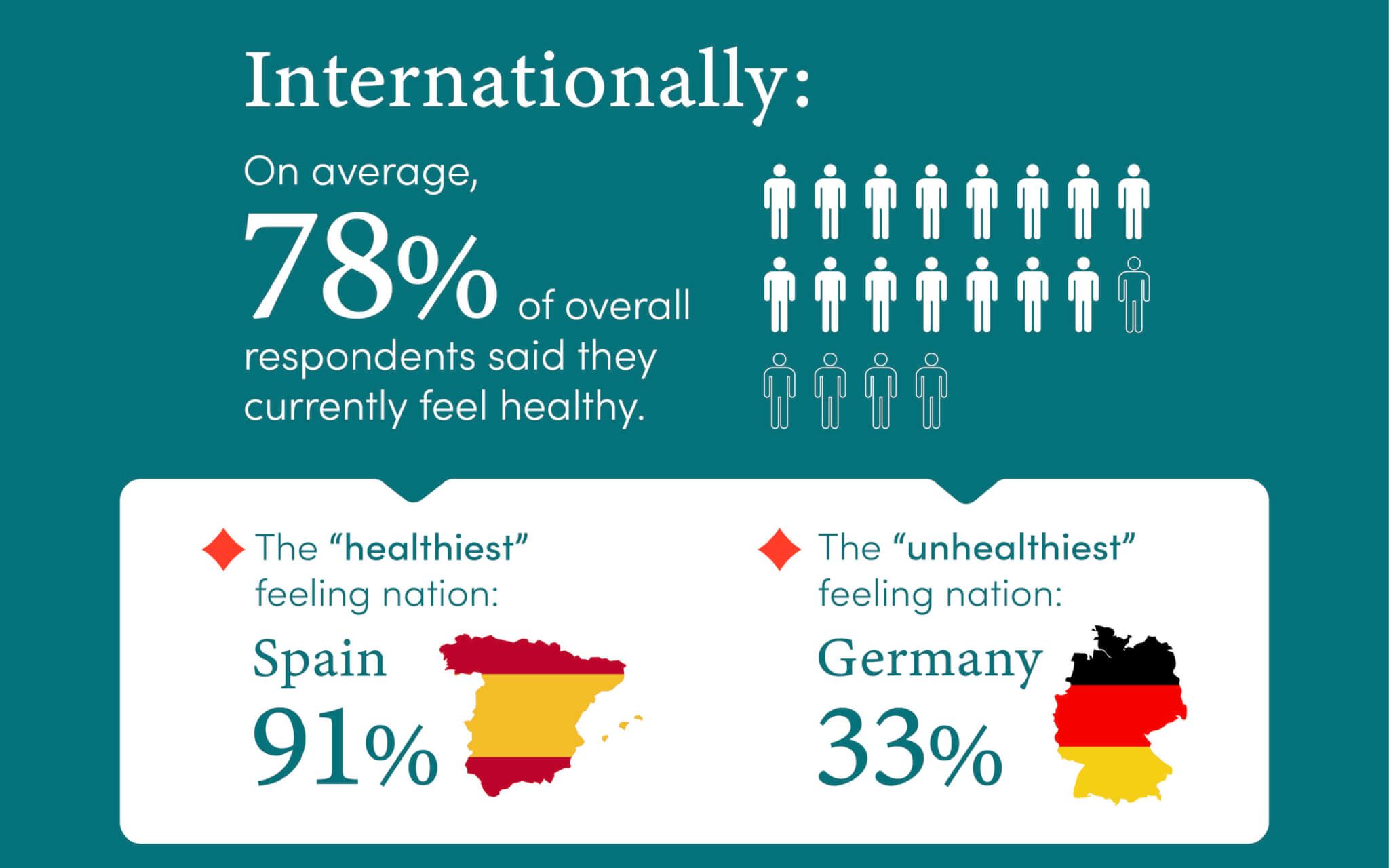NEW YORK — Are you seeking a healthier lifestyle in 2023? Then you may want to find your passport and head to Japan. A new international poll of 8,000 respondents from Australia, Brazil, Germany, New Zealand, South Korea, Spain, the United Kingdom, and the United States reveals that out of all 195 nations, 15 percent believe Japan to be the healthiest.
Rounding out the top five countries that people think are the healthiest: Switzerland (12%), Sweden (12%), Norway (10%), and New Zealand (9%). The poll also shows that nearly four out of five (78%) of all respondents say they currently feel healthy.
Out of the eight countries surveyed, respondents from Spain (91%), Brazil (86%), and America (86%) claimed they currently felt healthy — more than the other nations surveyed (76% in the United Kingdom, 74% in New Zealand, 74% in Australia, and 73% in South Korea). Meanwhile, respondents from Germany reported feeling the most unhealthy out of the eight nations, with 33 percent categorizing themselves as currently being “very unhealthy.”
Commissioned by Noom and conducted by OnePoll, the study found that across the globe, most respondents defined “healthy” as being physically fit (31%), exercising regularly (31%), being emotionally happy (30%), and getting adequate sleep on a regular basis (30%).
In the U.S., respondents demonstrated an awareness of the connection between mind and body when it comes to health, saying that their definition of “health” is both exercising regularly (32%) and being emotionally happy (24%).
In South Korea, health was all about being stress-free (48%). In New Zealand, it was critical to get adequate sleep (34%). In Australia, the top definition was eating plenty of fruits and vegetables (36%).

Is it the government’s job to keep you healthy?
A majority of respondents (57% globally) reported wanting government support in caring for their health. Respondents believed that government interventions like improving access to mental health care (34%), making medications more affordable (24%), and banning artificial preservatives (21%) would all positively impact their health and well-being.
The survey also revealed the biggest issues impacting both physical and mental wellness on an international scale, providing even more support and evidence of why health solutions must address the two in tandem.
When it comes to mental wellness, respondents report struggling to manage stress around general physical health concerns (48%), the economy (43%), finances (41%), their jobs (40%), and personal responsibilities (32%).
Meanwhile, maintaining family and caregiving responsibilities (17%), romantic lives (14%), and friendships (11%) were found to be among the biggest issues impacting physical health. Fifty-three percent claim they take their health more seriously since the COVID-19 pandemic first began. Similarly, 21 percent believe they have felt more productive on an average day during that same timeframe.
Although overall productivity reportedly increased among respondents, some nations felt their productivity has decreased since the onset of the pandemic. Fifty-four percent of South Korean and 46 percent of American respondents say their productivity throughout their day-to-day lives has taken a dip.
“It is encouraging to see people across the globe thinking about health in multifaceted, holistic ways, and embracing the mind-body connection,” says Saeju Jeong, co-founder and CEO of Noom, in a statement. “This realistic approach signals that our society is shifting toward more sustainable health practices, a philosophy that we have believed in since our beginning. We hope to see more digital health organizations promote holistic solutions as it’s clear our industry has a continued opportunity to lead dialogues about what true health looks like and how to maintain it for the long-term.”
Americans are bitterly divided, even about healthy living
The survey also revealed a possible partisan divide in how U.S. citizens want their government to play a role in their health: 38 percent of Americans want the government to enact policies to encourage healthier living, while 40 percent disagree.
Since the pandemic began, 44 percent of Americans have picked up good habits in some capacity. The factors that most helped them stick with their habits were having support from family and friends (25%), mental health professionals (25%), and digital health programs (24%).
Two in three (66%) have developed at least five new habits since the onset of COVID-19 that have now become a part of their daily routine.
For many, adopting healthy habits is still a challenge. In fact, many shared what they would rather do than make the healthy changes needed to lose weight. Specifically, they’d rather give up their favorite streaming apps for a year (20%), two weeks of vacation (20%), sex for a year (20%), and social media for a year (18%).
Survey methodology:
This random double-opt-in survey of 8,000 general population adults from Australia, Brazil, Germany, New Zealand, South Korea, Spain, the United Kingdom and the United States was commissioned by Noom between December 23, 2022 and January 3, 2023. It was conducted by market research company OnePoll, whose team members are members of the Market Research Society and have corporate membership to the American Association for Public Opinion Research (AAPOR) and the European Society for Opinion and Marketing Research (ESOMAR).

who are the 9% then ? Probably the people that feel the most healthiest….Everyone knows the vaccines kill people. Stop spreading BS…